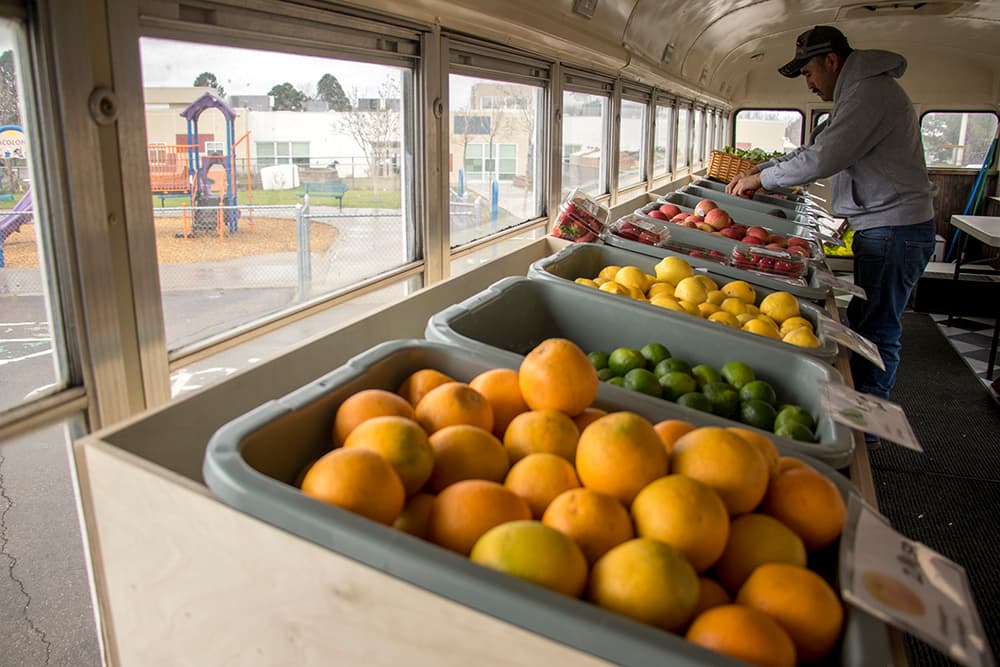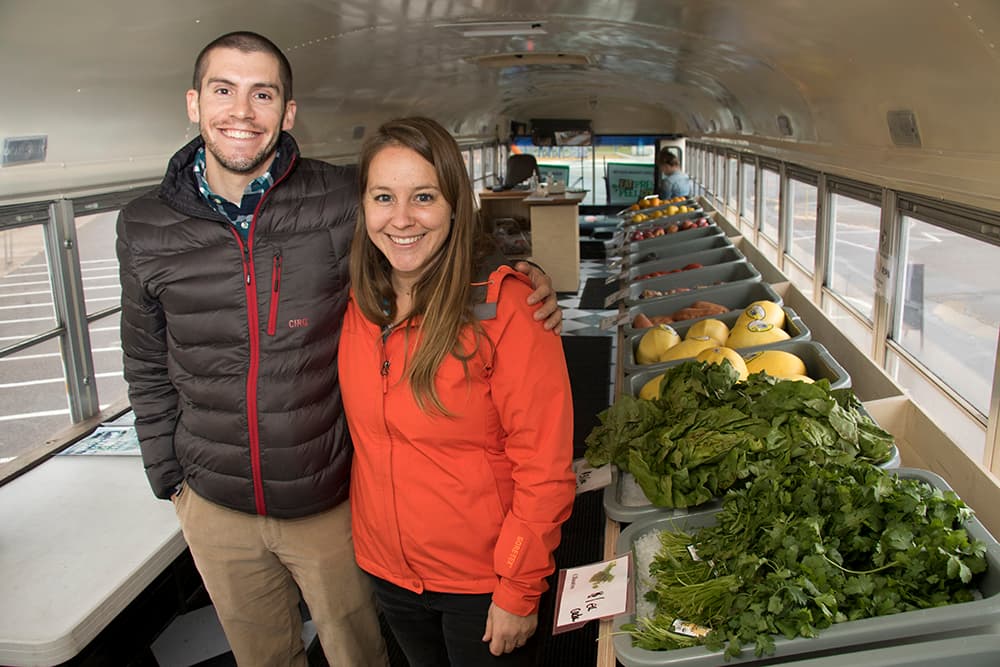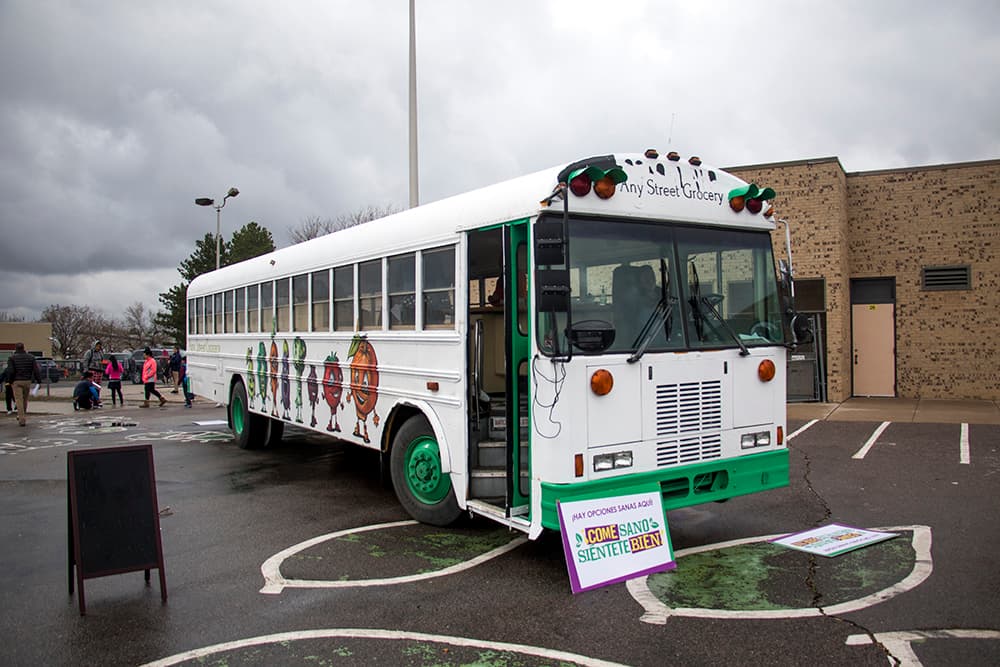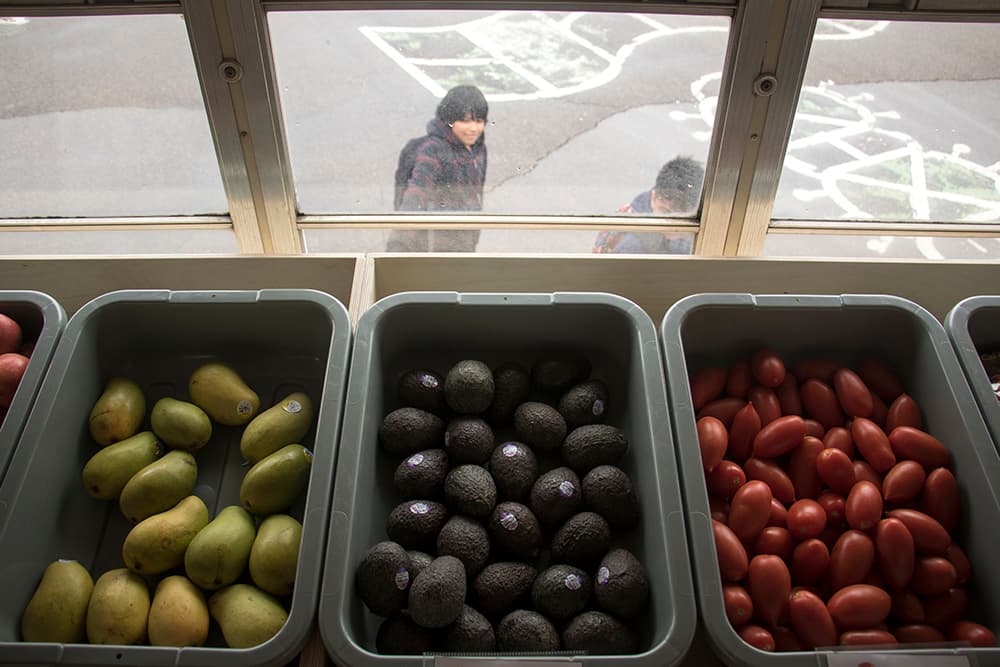
Ashleigh Ruehrdanz and Steven Lockhart were studying Denver's underserved neighborhoods in 2015 when they had an idea. Too many people live without easy access to a full-service grocery store; so, they thought, "Why wouldn't we -- couldn't we -- bring healthy foods directly to people?"
That year, they officially incorporated Any Street Grocery, a dream to create a mobile farmer's market that they could drive right into communities facing food insecurity. They bought an old school bus, ripped out the seats and installed shelves and tile flooring. All the while, they pitched their vision to communities and city officials alike.
Earlier this year, their fruit and veggie vessel took its maiden voyage in a pilot period funded in part by Denver's Healthy Corner Store Initiative. Now, they're nearly ready for an official launch.
Any Street Grocery offers organic fruits and vegetables at prices as close to market rates as they can get them. Their market stops have been once every few weeks or so as they get situated in their early stages, but Ruehrdanz and Lockhart hope to be on a regular weekly schedule later this year.
For its co-founders, the venture is an exercise in taking matters into their own hands. Before they met, Lockhart was surveying connectivity issues in Northeast Park Hill.
"Years later," Ruehrdanz explained, "these problems had not improved."
Then, an intern for the city put together a study that estimated around 90 percent of Montbello residents living around McGlone Academy, an elementary school, were using a nearby 7-Eleven as their main source of food.
"That's kind of how the whole concept got started," Ruehrdanz said.

It's no secret that neighborhoods like Globeville, Elyria-Swansea, Westwood and Montbello lack a full-service grocery.
Census data from 2013 shows these areas have "low access" to fresh food, and the city has set aside millions of dollars to address the problem.
Councilwoman Stacie Gilmore, who presides over Montbello and Green Valley Ranch, is also well aware. When she spoke to Denverite in April about a massive new development just across her district's border in Aurora, she was quick to say she hoped it would attract a real grocery store.
But finding a solution takes a bit of creative license. Though the city might have the power to fix problems with sidewalks or transit, building a grocery store in an area without one falls largely to corporate interests. Neighborhoods without a lot of money aren't often a safe investment for large grocery chains.
"If you think about RiNo, for example, Five Points," Ruehrdanz said, "as they have gentrified and changed a lot, that's when the grocery stores go in."
She points to the new Natural Grocers on Brighton Boulevard.
"That didn’t go in until there were enough developers," she said. "It wasn't: 'We should do something great for the community.'"
But a good idea takes work to hit the road.
Ruehrdanz and Lockhart's idea was met with interest from fresh food advocates and Denver officials alike. Last fall, they were accepted into the Uncharted Food Access incubator program, a partnership with the city that connected them with mentors and resources. Then, they received leftover funds from a Healthy Corner Store Initiative grant program to get the bus rolling.
But getting the proper permits to operate proved tougher than expected.
"It was long and grueling because nobody really knew what to do with us," Ruehrdanz said, "We don't do all the things that a food truck does, but we also are not an ice cream truck, we’re not a farmers market."

Eventually, Any Street was granted a food truck license, which allowed them to finally drive on school campuses and begin offering fruit and vegetables for sale. But that permit isn't perfect.
For one thing, a food truck license doesn't allow Any Street to set up anything outside of their retrofitted bus. Ruehrdanz said she'd love to have an educational component, some kind of tent and table setup to greet passers by. It also comes with restrictions on operating too close to residential areas, which Ruehrdanz said kind of defeats their purpose to provide easy access to their goods.
So now, as they try to put a dent in Denver's food deserts, Ruehrdanz and Lockhart are also trying to change the way the city deals with enterprises like theirs. As part of their pilot process, the team submitted an official request to the mayor's office asking for a new kind of mobile food permit.

And their efforts aren't solely for their own success. Ruehrdanz said she sees Any Street as a "trailblazer" that is "setting up an easier route for more competition to come in."
Then, with a new pathway in place for more mobile groceries to succeed, maybe all of Denver's food deserts will be able to expect regular access to fresh fruits and veggies.
While the mayor's office didn't provide an update on Ruehrdanz and Lockhart's permit request for this story, there's promise in that the Department of Public Health and Environment is planning on an official kick-off for Any Street Grocery sometime soon. In the meantime, May 10 will be their seventh outing in the bus and the last one with city funding.
You can keep up with Any Street Grocery's itinerary on their website.
Correction: This story initially named a date for the city's kick-off for Any Street Grocery, but their official launch is yet to be determined.












